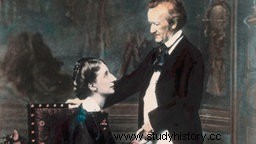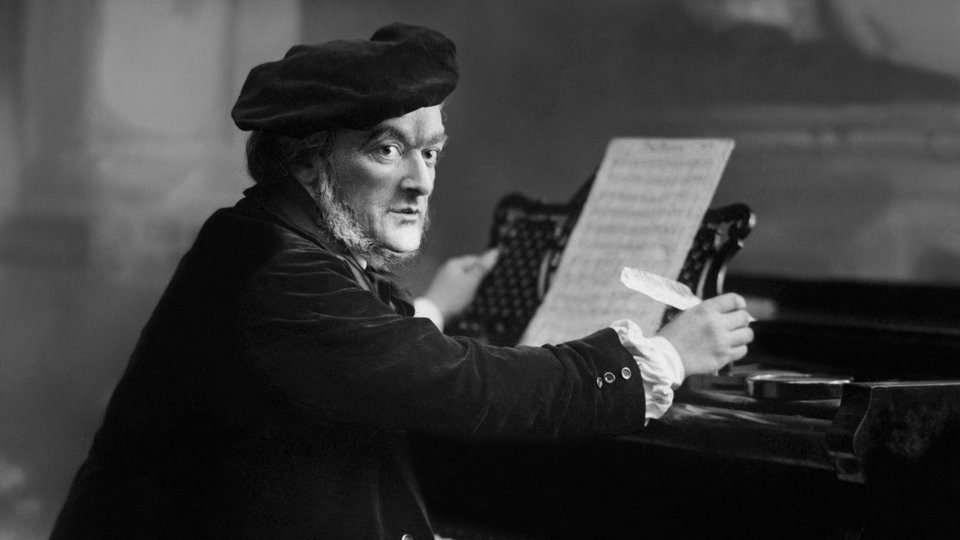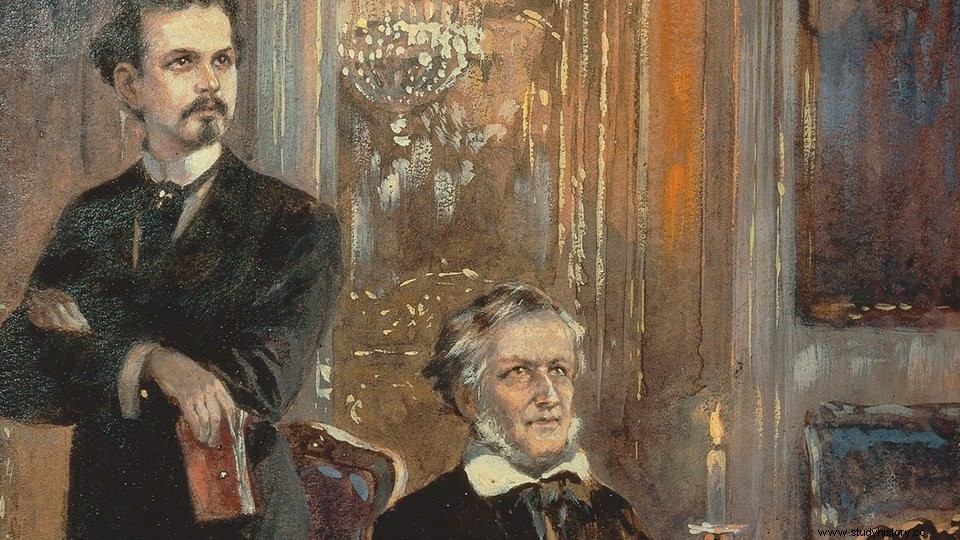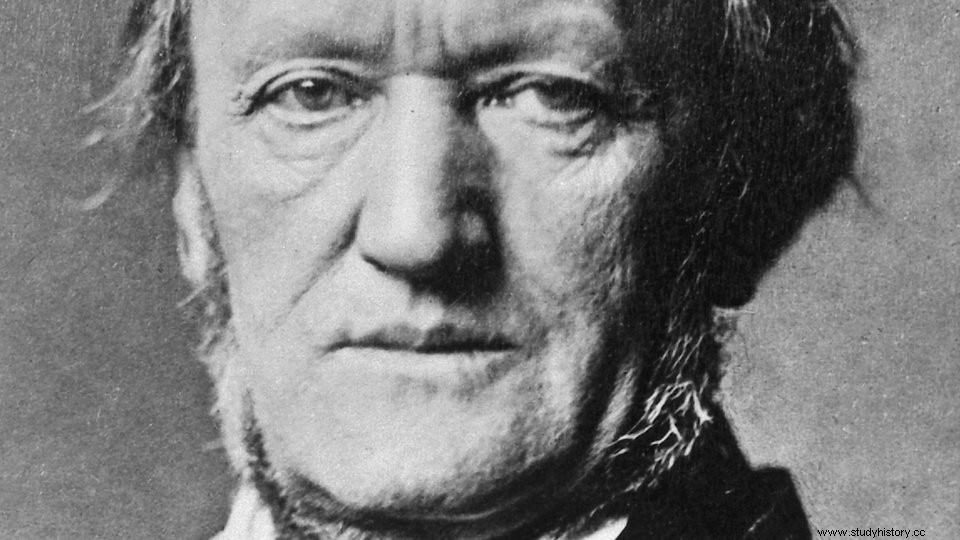Richard Wagner revolutionized opera, influenced music history and built his own festival hall. A brilliant composer who came from a humble background and ended up associating with emperors and kings.
Childhood in the throes of war
Wagner had many facets:visionary as an artist, unfit as a businessman, difficult to deal with privately. His life and work fascinates to this day.
Richard Wagner, born on May 22, 1813 in Leipzig, was less than five months old when war came to his hometown. The Battle of the Nations near Leipzig begins on October 16, 1813, in which Napoleon suffers his decisive defeat against Prussian, Austrian and Russian troops.
But victory in the war of liberation came at a high price. More than a hundred thousand dead soldiers are lying on the streets of the city, and the civilian population is also suffering:epidemics are raging, food and drink are scarce, the noise of battles and the smell of corpses traumatize many.
The Wagner family is also affected:Richard Wagner's father Friedrich dies in November 1813, two months later his sister and shortly afterwards his grandmother. And Richard himself, malnourished and frightened, often stands on the brink of death in his first year of life.
In 1814, Wagner's mother moved to Dresden with her eight children and married the actor Ludwig Geyer, a family friend. He often takes little Richard to the Dresden Court Theater, where he gets his first role at the age of four. He plays an angel in Carl Maria von Weber's "The Vineyard on the Elbe".
After Geyer's death in 1821, Wagner came to live with his brother Karl Geyer in Eisleben, where he saw Weber's popular opera "Freischütz" at the age of nine and then made a decision:he wanted to become a famous opera composer who set his own works to music.
A revolutionary idea, because at that time the text and music of an opera were always in different hands. There is no such thing as a music drama as a total work of art.
Wagner wants to change that. As a teenager he wrote his first dramas and spent nights copying the score of Beethoven's Ninth Symphony in order to internalize its compositional technique.
Debt and fleeing abroad
In 1831 Wagner began studying music in Leipzig and took composition lessons from Thomaskantor Christian Theodor Weinlig. He recognizes the talent of his protégé, encourages it and even waives a fee.
After various journeys, during which he came up with many ideas for his works, Wagner was offered a position as music director of the Magdeburg theater company in 1834. The ensemble may be second-rate, but Wagner falls in love with the actress Minna Planer and stays.
In the collaboration with the theater company, Wagner introduces many innovations:he encourages the singers to perform like actors, with great facial expressions and gestures. An instruction that has not been heard on German opera stages to date.
In addition, Wagner completely redefines the role of the conductor. He turns to the orchestra instead of turning his back – as has been the norm up to now – seeks eye contact with the musicians and gesticulates like a berserker. When it comes to tempi and playing style, he often ignores the composer's specifications and sets his own accents.
After several canceled performances and theater bankruptcies, Wagner has high debts. He travels via Berlin to Königsberg, where he marries Minna Planer in 1836. When another engagement went wrong, the two decided to flee from Wagner's creditors in 1839. Under adventurous circumstances, they travel by ship from East Prussia via London to Paris, the opera city of the time.
But Wagner's attempts to gain a foothold in the cultural scene there fail. His debts are increasing, he has to pawn his wedding ring and wedding gifts. The tide did not turn until 1842:Wagner's opera "Rienzi" premiered in Dresden and became a great success.
-
 Why the Wagners also embody the dark side of German history | more
Why the Wagners also embody the dark side of German history | more
Artistic and Political Revolutions
Wagner receives offers from many European theaters and decides on the Dresden Semperoper. In 1843 the premiere of the "Flying Dutchman" took place there. Compared to the conventionally structured opera "Rienzi", Wagner is breaking new creative ground:The "Flying Dutchman" is a through-composed unit in which musical leitmotifs characterize moods and people, the text is much more important.
In this way, Wagner approaches his ideal of "musical drama". But the play is a failure. Wagner's attempt to revolutionize opera initially fails.
The revolutionary mood that prevailed in Germany from 1848 also affected Wagner. He wrote pamphlets and took part in the May Revolution in Dresden in 1849. But when this is crushed by Prussian troops, his merits are no longer of any use to him. He is wanted on a warrant and has to leave Germany. Wagner flees to Switzerland with a false passport.
However, his works continue to be performed and enjoy increasing popularity nationally and internationally.

Opera Innovators
Friendship with the "Fairy Tale King"
Only in 1862 did Wagner receive an amnesty and can return to the German Reich. He goes to Vienna to stage "Tristan und Isolde". But after 77 rehearsals the end comes:The extremely demanding opera cannot be performed, according to the verdict of those involved. Wagner faces imprisonment because of his debts, but before he is thrown into the debt tower to force payments to his creditors, he flees the city in drag.
The financial and artistic debacle encourages him in a plan he has been harboring for a long time:he needs his own theatre. He wants to perform his musical dramas entirely according to his ideas, without having to take other productions into account. But how is Wagner supposed to realize this dream?
Help comes from an unexpected and high-ranking position:the newly crowned Bavarian King Ludwig II, a fervent admirer of Wagner, calls him to the court and pays his debts. The idea of a Wagner festival hall also met with open ears at the "Fairy Tale King".
But in Bavaria there is criticism of the expensive plans. When it became known that Wagner was trying to influence the king politically, the cabinet threatened to resign. Ludwig II can no longer keep his friend, Wagner is banned from court in December 1865 and goes back to Switzerland.
His wife Minna, from whom he had previously separated, dies a little later. His lover Cosima von Bülow - a daughter of the composer and pianist Franz Liszt, with whom Wagner already has a daughter - moves in with him in his villa on Lake Lucerne. And this despite the fact that she is still married to the conductor and Wagner admirer Hans von Bülow.

Ludwig II is Wagner's biggest financial backer
The "Ring of the Nibelung" in Bayreuth
In Switzerland Wagner completes the "Meistersinger von Nürnberg", his most humorous work, and continues to write the "Ring des Nibelungen", on which he has been working intermittently since 1851. He wants to show the multi-part "stage festival" as a complete work on four consecutive days.
But Ludwig II thwarts his plans:the Bavarian king, who owns the rights to the "Ring", orders the performance of "Rheingold", the first part of the tetralogy, against Wagner's will in 1869. A year later he also had the second part "Walküre" premiered.
In 1870 Wagner married the now divorced Cosima von Bülow, with whom he now had three children:Isolde, Eva and Siegfried. He kept looking for a suitable city for his festival and finally found what he was looking for in Bayreuth in 1871. In 1872 the cornerstone for the Festspielhaus was laid, which broke with many traditions:the orchestra remained invisible in the ditch, the "mystical abyss" as Wagner called it. In addition, unlike most other theaters, the audience sits in the dark.
Once again, Wagner is running out of money. He writes commissioned compositions, goes on tour as a conductor and jeopardizes his health. He often complains of heart problems.
In November 1874 the "Ring des Nibelungen" was finally composed and Wagner announced the first festival for the summer of 1876. In August 1876, the red carpet was rolled out, over which almost the entire political and cultural elite of Europe walked, including Kaiser Wilhelm I, Peter Tchaikovsky and Friedrich Nietzsche.
Although various mishaps happen, the audience is enthusiastic about the music and the staging. Wagner is celebrated worldwide as the innovator of opera.
But he doesn't rest on his laurels, but instead gets to work on his last work:"Parsifal". Wagner completes his "world farewell work" in 1882, the performances are a complete success - also financially. The continued existence of the Bayreuth Festival is thus secured.
Wagner travels to Venice with his family to restore his ailing health. But the change of air is useless. He dies in his wife's arms on February 13, 1883.

Wagner dies shortly after completing his "world farewell work"
